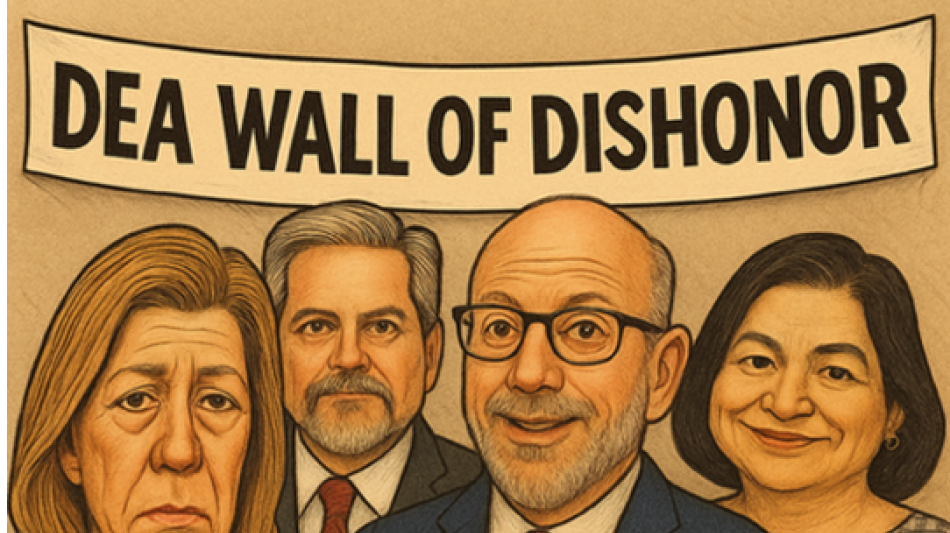

Biden's DEA Wall of Marijuana Dishonor: The DEA Pattern of Corruption Is Now Impossible to Deny, President Trump Fixing
Now, President Trump is poised to fix the marijuana rescheduling issue.
From DEA unconstitutional tribunals to Anne Milgram swamp contracts and MMJ BioPharma's seven year clinical trial delays, the DEA's Diversion leaders built an illegal fortress of obstruction around medical cannabis.
WASHINGTON, D.C., AL / ACCESS Newswire / October 18, 2025 / For decades, the Drug Enforcement Administration (DEA) preached "law and order."
But behind the curtain of press releases and public hearings lay a very different reality - one defined by unconstitutional procedures, ethical breaches, and bureaucratic cruelty that left patients with Huntington's Disease and Multiple Sclerosis waiting years for medicine that Congress already legalized.
The DEA Wall of Marijuana Dishonor has collapsed under its own corruption.

Action 1: The Catch-22 - Matthew Strait's FOR EVER changing Impossible Rules
What they said: "Follow the rules and you'll be approved."
What they did: Matthew Strait, former Deputy Assistant Administrator, invented a "bona fide supply agreement" requirement years after cannabis research applications were filed - a retroactive trap that made lawful registration impossible.
The proof: DEA-registered companies that followed every federal law were blocked, while illegal state markets flourished unchecked.
Action 2: The Unconstitutional Tribunals - DEA Aarathi Haig's Legal Disaster
What they said: "We operate under proper legal procedures."
What they did: DEA attorney Aarathi Haig defended the agency's in-house court system even after the Supreme Court ruled it unconstitutional in Axon v. FTC (2023) and Jarkesy v. SEC (2024).
The proof: The Department of Justice itself withdrew its defense of DEA's tribunal structure, acknowledging it violated Article II and the separation of powers - yet Haig and her colleagues kept using it.
Action 3: The Ethical Collapse - Aarathi Haig's NJ Law Bar Trouble
What they said: "We maintain the highest standards."
What they did: Haig continued practicing law for DEA while not in good standing with the New Jersey Bar, as verified by state records.
The proof: A February 14, 2023 letter from the New Jersey Board of Bar Examiners confirms Haig was ineligible for a Certificate of Good Standing for failing to pay mandatory fees, complete continuing education, and maintain IOLTA compliance - in direct violation of 28 U.S.C. § 530B, which requires federal attorneys to adhere to state ethics rules.
Action 4: The Swamp Contracts - DEA Anne Milgram's Crony Network
What they said: "We are responsible stewards of taxpayer dollars."
What they did: Former DEA Administrator Anne Milgram handed out millions in no-bid contracts to friends and former colleagues, prompting an ongoing DOJ Inspector General investigation.
The proof: Congressional records and whistleblower accounts reveal a pattern of insider payments and conflict of interest - all while Milgram ignored DEA's core mission of enforcing the law and advancing legitimate research.
Action 5: The Seven-Year Stonewall - DEA Thomas Prevoznik's Delay Machine
What they said: "We process applications in a timely manner."
What they did: Thomas Prevoznik's division has stalled MMJ BioPharma's cannabis manufacturing application since 2018 - despite FDA Investigational New Drug (IND) approval and Orphan Drug designations for its Huntington's and Multiple Sclerosis treatments.
Patients with degenerative neurological diseases have been forced to wait as their conditions worsen - victims of bureaucratic negligence masquerading as procedure.
While these officials - Strait, Haig, Milgram, and Prevoznik - publicly celebrated "science-based regulation," their internal actions revealed something darker:
An unconstitutional court system run by agency insiders
An impossible regulatory maze designed to fail applicants
An ethical swamp of self-dealing and crony contracts
A seven-year blockade on federally legal medicine
Their exits tell the real story:
Matthew Strait - retired under scrutiny.
Anne Milgram - resigned amid federal investigation.
Thomas Prevoznik - quietly retiring under scrutiny.
Aarathi Haig - ethically compromised and professionally tainted.
They weren't reforming the system - they were fleeing it.
Patients Still Waiting. But Not for Long.
The real victims of the DEA's misconduct aren't the bureaucrats or the politicians - they're the patients living with Huntington's Disease and Multiple Sclerosis, whose suffering has been prolonged by regulatory malpractice.
"We've lost seven years - seven years of potential progress, of clinical data, of human hope," Boise said. "But the tide is finally turning."
The Turning Point: President Trump's Administration
As the Trump Administration continues its overhaul of the Justice Department and DEA, patient advocates are confident the White House will take decisive action.
President Trump has repeatedly pledged to put patients and science first, signaling his intention to clear the DEA backlog and restore lawful, evidence-based decision-making to medical cannabis research.
The Bottom Line
The DEA's "Wall of Marijuana Dishonor" is cracking under the weight of its own corruption.
Its architects have fled. Its constitutional foundation has collapsed.
And its legacy - obstruction, hypocrisy, and human suffering - will be remembered as a stain on American medicine.
But MMJ BioPharma remains.
Fully compliant. Fully lawful. Fully ready to lead the next chapter of pharmaceutical cannabis - one defined not by politics, but by patients, science, and justice.
About MMJ BioPharma Cultivation
MMJ BioPharma Cultivation, a subsidiary of MMJ International Holdings, develops pharmaceutical-grade cannabinoid formulations for FDA-regulated clinical trials targeting Huntington's Disease and Multiple Sclerosis.
The company holds Orphan Drug Designations and multiple IND filings, positioning itself as the first federally compliant producer of standardized cannabinoid medicine for neurological disorders.
MMJ is represented by attorney Megan Sheehan.
CONTACT:
Madison Hisey
[email protected]
203-231-8583
SOURCE: MMJ International Holdings
View the original press release on ACCESS Newswire
Y.Lewis--RTC



